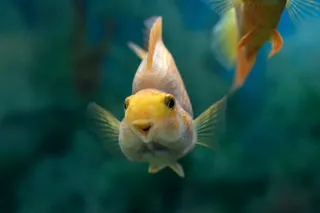Parrot communication in the wild from Karl Berg on Vimeo.
What's the News: Parrots, those irrepressible mimics of the animal world, are some of the few creatures known to have individual names: each bird has its own signature call that others use when addressing it and that the bird uses itself in avian "conversation." Scientists have long wondered where these calls come from. Now, a new study of wild parrots
shows that even before chicks can "talk," their parents have provided them with a moniker, which they will tweak and then use throughout their lives.
How the Heck:
While scientists have long known that parrots use signature calls and watched captive birds do it, they wanted to see how wild birds get names: are they biologically innate, chosen by each parrot itself, or somehow assigned by Mom and Dad?
To study this, the researchers set up video cameras in 16 ...













